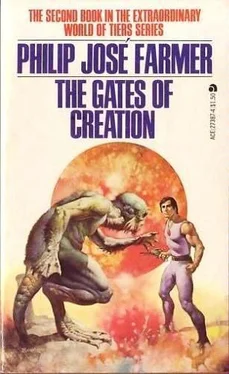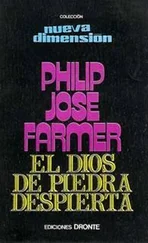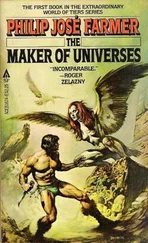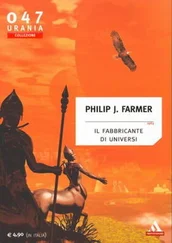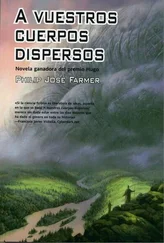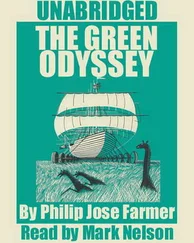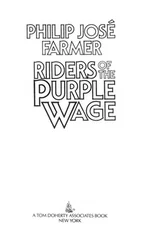The gondola would be airtight. Wolff had not yet worked out the problem of air-renewal and circulation or the other problems brought on by nongravity. Actually, they should have a certain amount of gravity. They would not be getting into space as a rocket does, which attains escape velocity. Levitated by the expanding gas in the lift-bladders, they would rise until the atmosphere gave out. Once past the atmosphere, the craft would lose its buoyancy, and would have to depend upon the pull of the moon and the weak reaction of wooden-cased rockets to give them thrust enough to escape the waterworld’s grip.
Moreover, if they did pull loose from the waterworld, they would be in danger of being seized by the field of the moon.
“There’s no way of determining the proper escape path and necessary vectors by mathematics,” Wolff said to Luvah. “We’ll just have to play it by ear.”
“Let’s hope we’re not tone-deaf,” Luvah said. “Do you think we really have a chance?”
“With what I have in mind, I think there is,” Wolff replied. “Just now, today, I want to think of other things. There are the spacesuits to work on for instance. We’ll have to wear them while in the gondola, since we can’t rely on the gondola being too airtight.”
The fulminate of mercury for the explosive caps was made. This was a dark-brown powder formed by reaction of mercury, alcohol, and concentrated nitric acid.
The nitric acid, which oxidized sulfur to sulfuric acid, was obtained through a series of steps. The sodium nitrate, gotten by crystallization from the bird droppings and human excrement, was heated with sulfuric acid. (The sulfuric acid was derived by burning sulfur with saltpeter, that is, potassium or sodium nitrate.)
Free nitrogen of the air was “fixed” by combining it with hydrogen (from the gas bladders) to form ammonia. The ammonia was mixed with oxygen (from an oxygen-producing bladder) at the correct temperature. The mixture was passed over a fine wire gauge made from smooth compact platinum to catalyze for catalysis.
The resulting nitrogen oxides were absorbed in water; the dilute acid was gotten by concentration through distillation.
The materials for the furnaces and containers and pipes were furnished by the vitreous stuff from the planet of skaters.
Black gunpowder was made from charcoal, sulfur, and the saltpeter.
Wolff also succeeded in making ammonium nitrate, a blasting powder of considerable power.
One day Vala said, “Don’t you think that you’re making far too many explosives? We can’t take more than a fraction on the ship. Otherwise, the ship’ll never get off the ground.”
“That’s true,” he replied. “Maybe you were also wondering why I’ve stocked the explosives at widely separated locations. That’s because gunpowder is unstable. If one pile goes up, the others won’t be affected.”
Some of the Lords paled. Rintrah said, “You mean the explosives we’ll be taking on the ship could go off at any time?”
“Yes. That’s one more chance we’ll be taking. None of this is easy or safe, you know. But I’d like to add a possibly cheering note. It is ironic and laughable, if we succeed, that Urizen himself has supplied the materials for his own undoing. He has furnished us with the basic weapons which might overthrow his supertechnology.”
“If we live, we’ll laugh,” Rintrah said. “I think, however, that Urizen will be the laugher.”
“Old Earth proverb: We’ll at least give him a run for his money. Another proverb: He who laughs last laughs best.”
That night Wolff went to Luvah’s hut. Luvah woke up swiftly on feeling Wolffs hand on his shoulder. He started to draw the knife made of flint from the tempusfudger planet. Wolff said, “I’m here to talk, not kill. Luvah, you are the only one I can trust to help me. And I need help.”
“I am honored, brother. You are by far the best man among us. And I know that you are not about to propose treachery.”
“Part of what I plan may seem at first to be treachery. But it is necessary. Listen carefully, young brother.”
Within the hour, they left the hut. Carrying digging and hacking tools, they went to the hill on which stood the twin gates. Here they were met by twenty natives, all of whom Wolff was sure he could trust. They began cutting and digging through the tangle of decayed vegetation and bladder roots that formed the island. All worked swiftly and hard, so that by the time the moon had passed and taken night with it, they had completed a trench around the hill. They kept on working until there was only a few inches of roots to go before coming to the water level. Then the natives placed ammonium nitrate and fulminate caps in the trench. When this was done, they threw in the chopped up roots and dirt and made an attempt to cover the signs of excavation.
“Anybody can see at a glance that digging has been done here,” Wolff said. “I’m banking on nobody coming here, however. I told all of you that today would be a rest day so that you wouldn’t rise until late.”
He looked at the gates. “Now you and I must travel the circuit again. And we must do it swiftly.”
When they came to the planet of the tempusfudgers, Wolff gave Luvah one of his blowguns. This was made of the hollow bamboo-like plants that grew on the mother-island. The natives used them to shoot darts tipped with a stupefacient made from a certain species of fish. They hunted the birds and the rats on the island with these.
Wolff and Luvah went into a canyon and there knocked out five of the fudgers. Wolff searched until he found the entrance to a burrow in which chronowolves lived. He placed the end of the blowgun inside the burrow and expelled the dart. After waiting a minute, he reached in and dragged out a sleeping wolf.
The animals, still unconscious, were cast into the gate that would open into Urizen’s world. Or it should lead there. It was possible that both gates merely led to the next secondary planet, as the gates on the birling world had.
“I hope the little animals will trigger off Urizen’s alarms,” Wolff said. “The alarms will keep him busy for a while. There’s also the possibility that the fudgers’ and wolf’s time-leaping and duplicating abilities will enable them to survive for a while. They may even multiply and spread through the palace and set off any number of traps and alarms. Urizen won’t know what the hell’s going on. And he’ll be diverted from the gate through which he expected us to come.”
“You don’t know that,” Luvah said. “Both these gates here, and both those on the waterworld, may just lead to another secondary.”
“Nothing’s certain in any of the multitudinous universes,” Wolff said. “And even for the immortal Lords, Death waits around every corner. So let’s go around the corner.”
They passed through the gate into the Weltthier. There was no sign of the chronobeasts. Wolff took heart at this, thinking that the chances were very good that the animals had gone into Urizen’s stronghold.
Back upon the waterworld, Luvah went off to accomplish his mission. Wolff watched him go. Perhaps he had been wrong in suspecting Vala of alliance with her father. But she had been too lucky in getting to a safe place whenever danger threatened. She had acted too quickly. Moreover, when they were in the river of the icerock planet, she had been too buoyant and just a little too assured. He suspected that the girdle around her waist contained devices to enable her to float. And there was the choosing of the gates by her. Every tune, these had led to a secondary. They should have gone through one of Urizen’s gates at least once. She had been too self-assured, even for her. It was as if she were playing a game.
Although she hated her father, she could have joined him to bring her brothers and cousins to death. She hated them as much as she hated her father. She could have transceivers implanted in her body. Thus, Urizen would be able to hear, and probably to see, all that she did. She would enjoy the game as a participant, perversely enjoy it even more if she were in some danger herself.
Читать дальше
